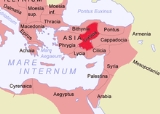
Galatian language
Encyclopedia
Galatian is an extinct Celtic language
once spoken in Galatia
in Asia Minor
(modern Turkey
) from the 3rd century BC up to at least the 4th century AD, although ancient sources suggest it was still spoken in the 6th century.
Of the language only a few glosses and brief comments in classical writers and scattered names on inscriptions survive. Altogether they add up to about 120 words, mostly personal names ending in -riks (cf. Gaulish -rix/-reix, Old Irish
ri, Gothic language
-reiks, Old Frankish
rik, Latin
rex) "king", some ending in -marus, dative -mari (cf. Gaulish -maros, Old Irish mor, Welsh
mawr) "great", and tribal names like Ambitouti (Old Irish imm- "around", Old Irish tuath "tribe"), and a lexical item drunaimeton "place of assembly" (cf. Old Irish drui "druid", Old Irish neimed "holy place"). Galatian is a Continental Celtic language contemporary and closely related to the Gaulish language
. St. Jerome wrote in a comment to "the epistle of St Paul to the Galatians" that the Galatians spoke the same language as the Treveri
(Trier
).
Celtic languages
The Celtic languages are descended from Proto-Celtic, or "Common Celtic"; a branch of the greater Indo-European language family...
once spoken in Galatia
Galatia
Ancient Galatia was an area in the highlands of central Anatolia in modern Turkey. Galatia was named for the immigrant Gauls from Thrace , who settled here and became its ruling caste in the 3rd century BC, following the Gallic invasion of the Balkans in 279 BC. It has been called the "Gallia" of...
in Asia Minor
Asia Minor
Asia Minor is a geographical location at the westernmost protrusion of Asia, also called Anatolia, and corresponds to the western two thirds of the Asian part of Turkey...
(modern Turkey
Turkey
Turkey , known officially as the Republic of Turkey , is a Eurasian country located in Western Asia and in East Thrace in Southeastern Europe...
) from the 3rd century BC up to at least the 4th century AD, although ancient sources suggest it was still spoken in the 6th century.
Of the language only a few glosses and brief comments in classical writers and scattered names on inscriptions survive. Altogether they add up to about 120 words, mostly personal names ending in -riks (cf. Gaulish -rix/-reix, Old Irish
Old Irish language
Old Irish is the name given to the oldest form of the Goidelic languages for which extensive written texts are extant. It was used from the 6th to the 10th centuries, by which time it had developed into Middle Irish....
ri, Gothic language
Gothic language
Gothic is an extinct Germanic language that was spoken by the Goths. It is known primarily from the Codex Argenteus, a 6th-century copy of a 4th-century Bible translation, and is the only East Germanic language with a sizable Text corpus...
-reiks, Old Frankish
Old Frankish
Old Frankish is an extinct West Germanic language, once spoken by the Franks. It is the parent language of the Franconian languages, of which Dutch and Afrikaans are the most known descendants...
rik, Latin
Latin
Latin is an Italic language originally spoken in Latium and Ancient Rome. It, along with most European languages, is a descendant of the ancient Proto-Indo-European language. Although it is considered a dead language, a number of scholars and members of the Christian clergy speak it fluently, and...
rex) "king", some ending in -marus, dative -mari (cf. Gaulish -maros, Old Irish mor, Welsh
Welsh language
Welsh is a member of the Brythonic branch of the Celtic languages spoken natively in Wales, by some along the Welsh border in England, and in Y Wladfa...
mawr) "great", and tribal names like Ambitouti (Old Irish imm- "around", Old Irish tuath "tribe"), and a lexical item drunaimeton "place of assembly" (cf. Old Irish drui "druid", Old Irish neimed "holy place"). Galatian is a Continental Celtic language contemporary and closely related to the Gaulish language
Gaulish language
The Gaulish language is an extinct Celtic language that was spoken by the Gauls, a people who inhabited the region known as Gaul from the Iron Age through the Roman period...
. St. Jerome wrote in a comment to "the epistle of St Paul to the Galatians" that the Galatians spoke the same language as the Treveri
Treveri
The Treveri or Treviri were a tribe of Gauls who inhabited the lower valley of the Moselle from around 150 BCE, at the latest, until their eventual absorption into the Franks...
(Trier
Trier
Trier, historically called in English Treves is a city in Germany on the banks of the Moselle. It is the oldest city in Germany, founded in or before 16 BC....
).
Sources
- Weisgerber, L. (1931). Galatische Sprachreste. In Natalicium Johannes Geffcken zum 70. Geburtstag 2. Mai 1931 gewidmet von Freunden, Kollegen und Schülern, 151–75. HeidelbergHeidelberg-Early history:Between 600,000 and 200,000 years ago, "Heidelberg Man" died at nearby Mauer. His jaw bone was discovered in 1907; with scientific dating, his remains were determined to be the earliest evidence of human life in Europe. In the 5th century BC, a Celtic fortress of refuge and place of...
: Carl Winter.

